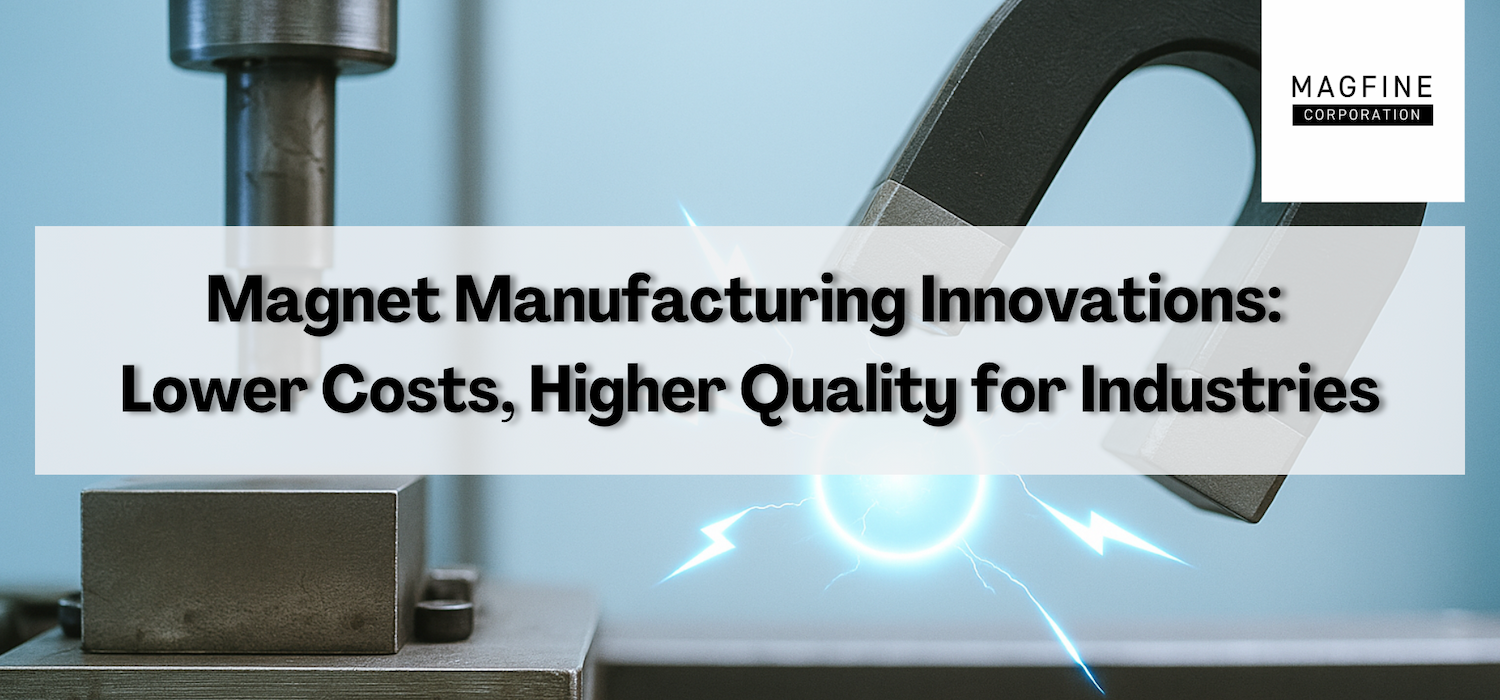Innovations dans la fabrication d'aimants au Canada : coûts réduits, qualité supérieure
L'industrie canadienne des aimants est à un tournant. Face à la demande croissante d' aimants en néodyme et d'autres aimants industriels , les entreprises sont de plus en plus contraintes d'offrir une qualité supérieure à moindre coût, tout en garantissant la durabilité. Une innovation qui attire l'attention est la consolidation par friction-malaxage (FSC) , une technique qui promet de transformer la production des aimants . Chez Magfine Canada , nous voyons là une occasion importante pour les industries canadiennes de renforcer leur position dans la chaîne d'approvisionnement mondiale.
Comprendre la consolidation par friction-malaxage (FSC)
La fabrication traditionnelle d'aimants repose sur la fusion de poudres de terres rares, leur pressage et leur frittage à haute température. Bien qu'efficace, cette méthode est coûteuse, énergivore et sujette à des problèmes tels que la porosité et l'oxydation. Le FSC adopte une approche différente. Au lieu de fondre, le FSC consolide les poudres mécaniquement à l'aide d'un outil rotatif et d'une pression appliquée. Ce procédé à l'état solide évite de nombreux pièges du frittage conventionnel.
Idée clé : Le FSC a le potentiel de produire des aimants avec moins de défauts, une plus grande densité et des coûts de production inférieurs, le tout sans compromettre les performances.
Pour les fabricants canadiens, l’adoption du FSC pourrait signifier des chaînes d’approvisionnement fiables, de meilleures structures de prix et des aimants hautement performants qui soutiennent la croissance dans des secteurs comme l’automobile, les énergies renouvelables et l’aérospatiale.
Pourquoi le FSC est important pour les industries canadiennes
Les entreprises canadiennes dépendent fortement des aimants importés, notamment les aimants en néodyme , essentiels aux véhicules électriques, aux éoliennes et aux équipements médicaux. Le FSC offre une voie vers la fabrication nationale qui non seulement soutient les économies locales, mais s'aligne également sur les objectifs de développement durable.
1. Coûts de production réduits
Les coûts énergétiques comptent parmi les plus importants postes de dépenses dans la fabrication d'aimants conventionnels. En éliminant le recours aux fours à haute température, le FSC réduit considérablement la consommation d'énergie. Pour Magfine Canada , cela signifie la possibilité de réduire le coût unitaire des aimants, offrant ainsi aux entreprises canadiennes des prix plus compétitifs sans compromettre la qualité.
2. Qualité d'aimant supérieure
Avec moins de défauts dus à la porosité et à l'oxydation, les aimants FSC offrent une fiabilité accrue. Ceci est particulièrement important pour les secteurs exigeant une précision absolue, comme l'aérospatiale et les technologies médicales avancées. Un aimant doté d'une densité et d'une intégrité structurelle améliorées offre une tranquillité d'esprit pour les applications critiques.
3. Alignement sur les objectifs de durabilité
Le Canada a pris des engagements importants pour réduire son empreinte carbone. Le FSC s'inscrit parfaitement dans ce cadre en réduisant la consommation d'énergie et en permettant la compatibilité avec les matières premières magnétiques recyclées. Cela ouvre de nouvelles perspectives aux initiatives d'économie circulaire, permettant aux industries de réutiliser les terres rares tout en réduisant leur impact environnemental.
4. Renforcer les chaînes d'approvisionnement canadiennes
La dépendance excessive aux aimants importés rend les industries canadiennes vulnérables aux perturbations de l'approvisionnement mondial. En tirant parti du FSC et en développant la production nationale, le Canada peut prendre des mesures significatives pour sécuriser sa chaîne d'approvisionnement. Cette résilience permet aux entreprises canadiennes d'être moins exposées aux incertitudes du commerce international.
Les opportunités et les défis du FSC
Malgré son potentiel, le FSC est encore en pleine évolution. Passer des expériences en laboratoire à la production industrielle à grande échelle présente des défis, notamment :
- Développer des outils durables capables de gérer de longues séries de production
- Assurer un alignement cohérent des grains pour des performances magnétiques élevées
- Sécuriser les investissements dans les usines pilotes et l'adoption industrielle
Néanmoins, l’opportunité est claire : les entreprises qui investissent tôt dans le FSC peuvent obtenir un avantage concurrentiel en termes de coût, de qualité et de durabilité.
Le rôle de MagFine Canada dans le soutien à l'innovation
Chez Magfine Canada , nous croyons qu'innover est essentiel pour rester à l'avant-garde. Bien que les aimants FSC ne soient pas encore commercialisés, nous nous engageons à aider les industries canadiennes à accéder aux meilleures solutions disponibles aujourd'hui. Cela comprend :
- Aimants industriels personnalisés adaptés à des applications uniques
- Une large gamme d' aimants en néodyme conçus pour les environnements exigeants
- Consultation d'experts pour aligner les solutions magnétiques sur les exigences du projet
En surveillant de près les technologies comme le FSC, nous garantissons que nos clients sont bien placés pour adopter les nouvelles avancées dès qu’elles deviennent commercialement viables.
Perspectives d'avenir : l'avenir de la fabrication d'aimants au Canada
Le Canada est bien placé pour bénéficier grandement des avancées technologiques en matière d'aimants. Qu'il s'agisse de soutenir l'adoption des véhicules électriques ou d'alimenter des projets éoliens, les aimants haute performance sont au cœur des stratégies d'énergie propre et de fabrication de pointe. Le FSC, combiné à l'accent mis par le Canada sur le développement durable, ouvre la voie à l'innovation locale, en phase avec les objectifs économiques et environnementaux.
Pour les entreprises qui cherchent à assurer leur avenir, s'associer à un fournisseur qui comprend ces innovations est essentiel. MagFine Canada s'engage à être ce partenaire, en fournissant des aimants fiables au Canada dès aujourd'hui, tout en se préparant à la prochaine génération de technologies de fabrication.
Questions-réponses : Innovations dans la fabrication d'aimants
Q : Qu'est-ce qui différencie le FSC de la fabrication traditionnelle d'aimants ?
R : Contrairement aux méthodes de frittage traditionnelles, le FSC est un procédé à l’état solide qui réduit l’oxydation, diminue les coûts et produit des aimants plus denses et plus performants.
Q : Quand les aimants FSC seront-ils disponibles au Canada ?
R : Le FSC passe actuellement du développement en laboratoire à la production pilote. Bien que la commercialisation à grande échelle puisse prendre du temps, MagFine Canada suit activement les progrès afin de proposer ces solutions à ses clients le plus rapidement possible.
Q : Quelles industries bénéficient le plus des aimants hautes performances ?
R : L’automobile (véhicules électriques), les énergies renouvelables (éoliennes), l’aérospatiale et les équipements médicaux font partie des principales industries qui s’appuient sur des aimants en néodyme et des aimants industriels de haute qualité.
Q : Comment MagFine Canada soutient-elle les entreprises aujourd’hui ?
R : Nous proposons une large gamme d’ aimants en néodyme et d’aimants industriels , ainsi que des solutions personnalisées adaptées aux besoins de l’industrie canadienne.
Découvrez davantage d’informations sur l’avenir de la technologie magnétique sur le blog Magfine Canada , où nous partageons régulièrement des mises à jour sur les innovations de l’industrie et des solutions pratiques pour les entreprises canadiennes.



















